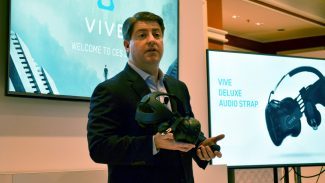Over the course of the last 50 years, capital markets have significantly codified a generational model approach consumer technology products. New “generations” of products are expected to come at a regular pace and provide increased features and reliability at the same prices. But depending upon the product type, the typical life cycle from one generation to the next can vary greatly. With the first wave of VR headsets now available to consumers, the time will come for the next generation to be announced and eventually launch. But when?
With no mention of next generation headsets from any of the major players at CES 2017, I put the question to HTC’s China Regional President of Vive, Alvin Wang Graylin. As the Vice-Chairman of Industry of VR Alliance and President of the VR Venture Capital Alliance, Graylin has a bird’s-eye view not only on the Vive hardware itself, but also on a wide range of VR hardware that’s in development from both startups and large scale business alike.
I asked Graylin how he thought about the VR headset upgrade cycle and its comparison to the early modern smartphone market, where the cadence of generational product improvements was on a nearly yearly cycle.
“Instead of looking at just the phone market—which is one type of very rapid consumer product—if you look at the other segment, which is the consoles, they’re about five or six year type of cycles,” he said. “What I would imagine is that the VR headsets are probably somewhere in between, probably tending closer toward the phone cycles than it is to the console cycles, but it’s definitely not as quick [as the early smartphone era] with the major updates.”
That puts the hardware refresh cycle of VR headsets, by Graylin’s estimate, somewhere between one and three years. Granted, the eventual cadence of next-generation products (in any industry) relies greatly on the pace of that industry’s R&D efforts.
And while the headset’s optics, display, and tracking might stay the same throughout a hardware generation, Graylin says there’s improvements to be made to the experience even within a generation, through accessories.
“But what we will do [between cycles] is accessories; the thing that you’re seeing is that we’ve created a good foundational platform for people to build things on. Changing it too quickly will actually make it very difficult for developers, make it difficult for accessory makers and for other types of systems that rely on it.”

At CES, HTC introduced the much anticipated Vive Tracker and Deluxe Audio Strap. Competitor Oculus has released earphones for the Rift and launched Touch, their own set of VR controllers.
The three major headset makers—HTC, Sony, and Oculus—have said almost nothing about their plans for next generation versions of the headsets. Still, Graylin thinks there’s a lot of innovation quickly to come to the young VR industry.
“I think we will have a lot of innovation […] [the speed of innovation] will likely be much faster than what we see for the phone industry,” he said. “I think Ray Kurzweil said, ‘the first 20 years of the 21st century was as much progress overall as the last 100 years of the 20th century.’ I think that’s the kind of speed we’re going to see; everything accelerates. And VR is the latest, greatest, and probably will be the longest lasting wave of technological revolution.”







